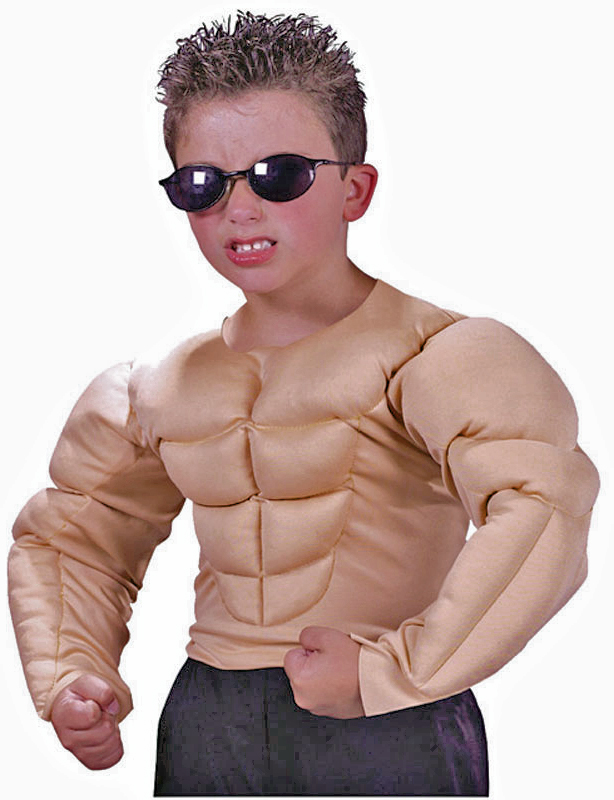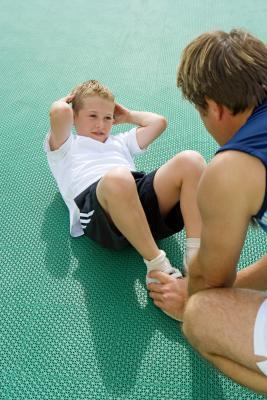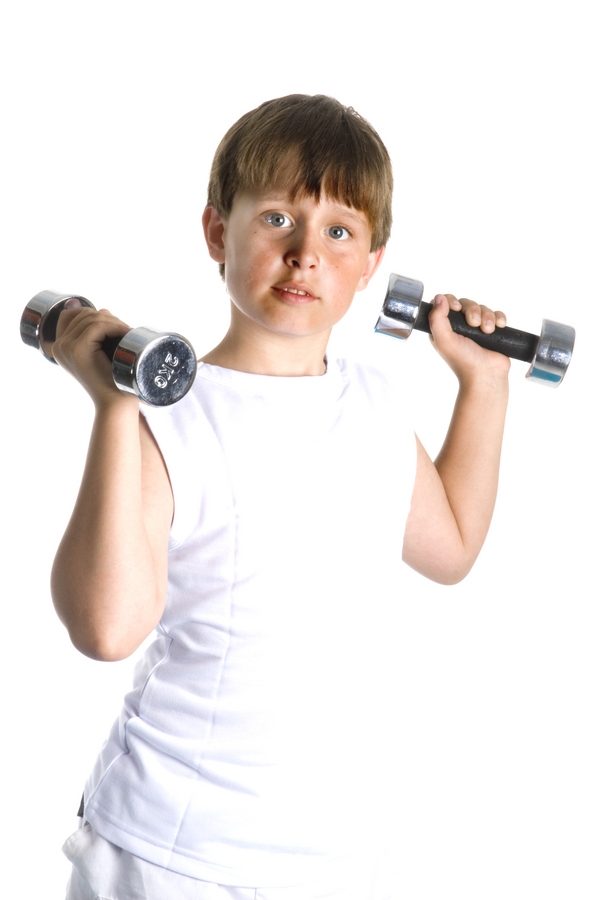Boys and Body Image
It’s not just for girls any more: worrying about body image and looks. The steady bombardment of advertising and other media images is taking its toll on boys as well – there is a tremendous pressure to look “lean and chisled.”
In and of itself that can be dealt with but when you couple that with the general lessening of social conscience and the adolescent feelings of indestructability you’ve got a problem – resorting to unhealthy behaviors and muscle enhancing drugs.
An extensive study of middle and high school students undertaken in Minnesota, and reported about in the pediatric journal Pediatrics (December 2012), unfortunately shows that the use of protein powders and steroids have become relatively common in that age group. Six percent of them say they have used steroids to improve the way their body looks.
 Two thousand seven hundred and ninety-three teens in 20 middle and high schools of Mineapolis/St. Paul responded to the question “how often have you done each of the following things in order to increase your muscle size or tone during the past year (never, rarely, sometimes or often)” and the parameters were: changed my eating, exercised more, used protein powder or shakes, used steroids and used other muscle building substances (i.e. creatine, amino acids, hydroxyl methylbutyrate, dehydroepiandrosterone or growth hormone.)
Two thousand seven hundred and ninety-three teens in 20 middle and high schools of Mineapolis/St. Paul responded to the question “how often have you done each of the following things in order to increase your muscle size or tone during the past year (never, rarely, sometimes or often)” and the parameters were: changed my eating, exercised more, used protein powder or shakes, used steroids and used other muscle building substances (i.e. creatine, amino acids, hydroxyl methylbutyrate, dehydroepiandrosterone or growth hormone.)
Now a bit of the first two are perfectly rational choices for overweight teens, but not when it becomes a daily focus or obsession. And definitely all of the rest represent at least irrational thinking and terrible life choices and at worst despicable pressure from coaches, peers or parents.
For children whose average age was 14 (half middle school and half high school) six out of every hundred claiming they use steroids is way more than expected. At a time when boys seem to have become focused on NOT being seen (i.e. not taking gym to avoid showering in public, wearing two sets of shorts under their pants etc.) many seem to love pulling up their shirts and showing off their “abs” – even devising a new name for them: “six pack.”
Boys were way more likely to do most muscle-enhancing behaviors, except for changing eating and steroid use which were equally likely in both sexes! Overweight girls were substantially more likely to use protein powder than girls of average body mass index; and, the likelihood increased for those in high school, of Asian descent and when the child was actively involved in the school’s sports teams.
The authors of the study, of course, called for more intervention programs in the schools and advised pediatricians to specifically target questions to patients – something that any thorough and responsible Pediatrician is (should be) already doing. And if secondary school coaches aren’t already giving consistent and meaningful counsel to their players, well, that’s just irresponsible.
What’s the Problem?
 Evil and conspiring people using children to make money is the real problem. Media, entertainment, sports and clothing companies using sensation and hype for appeal factor directed at children. No, they aren’t any different than the bombardment directed toward “social engineering” and manipulating adults into spending more money on nearly everything we buy; except, these are our kids and one should be able to hope that there would be a little different sense of social responsibility. We should expect and demand more.
Evil and conspiring people using children to make money is the real problem. Media, entertainment, sports and clothing companies using sensation and hype for appeal factor directed at children. No, they aren’t any different than the bombardment directed toward “social engineering” and manipulating adults into spending more money on nearly everything we buy; except, these are our kids and one should be able to hope that there would be a little different sense of social responsibility. We should expect and demand more.
Studies looking at the changing media portrayals over the past 30 years have males loosing body fat (not that they ever had much) and gaining muscle mass. Boys are highly influenced by media messages that their looking and feeling good is related to their physique. And, the easy internet accessibility to crap advertising and wrong information with hidden agendas doesn’t help.
After all “manning up” means being strong, doesn’t it? My superhero Halloween costume, padded to have six-packs, shows me how I need to look, right? Crash diets, over exercising, taking supplements and drugs and even smoking are the way to get buff – aren’t they?
The Real Facts
Changing your eating – is absolutely necessary to maintain a healthy body IF you are eating wrong. Most American teen diets pretty much follow what McDonalds, Burger King, Wendy’s, etc. etc. tell them to eat! Way too much carbohydrate and fat! Over all calories should go down IF you are eating too many as evidenced by being truly overweight – not just because you don’t look like a photoshopped image in the media.
 Exercising more – is the second most important habit necessary to maintain a healthy body IF you aren’t exercising enough. Exercising as much as you want, as long as you maintain your normal body weight, won’t hurt UNLESS you are fixated on muscle definition as your obsessive goal. That is impossible until your body grows up enough to tell you it’s ready (i.e. enters puberty).
Exercising more – is the second most important habit necessary to maintain a healthy body IF you aren’t exercising enough. Exercising as much as you want, as long as you maintain your normal body weight, won’t hurt UNLESS you are fixated on muscle definition as your obsessive goal. That is impossible until your body grows up enough to tell you it’s ready (i.e. enters puberty).
Trying to achieve that goal before the body is ready will hurt your body – almost always very badly.
Protein powder and shakes – in the US culture is absurd and almost always foolish. Literally only the food supplement industry benefits (and very lucratively) from tricking you into believing that having them pre-digest your meat for you so you can buy it in a jar is a way to get healthy. It isn’t even close.
You CANNOT build muscles by imbibing protein powder, unless you cannot get any other source of food protein. Let me say it another way: ingesting protein powders WILL NOT build you muscles any bigger or any faster than the level you are exercising is instructing your body to do… period. And, regular food protein is not only better for you but more satisfying as well. Any excess protein you take in is either turned into fat and stored, excreted in your feces, or forced through your kidneys and urinated.
Anabolic steroids – are a stupid choice for anyone and nearly always damaging or deadly to adolescents! They have phenomenally huge side effects on the teenage body both physically and mentally. They contribute to (even cause) emotional aberrations, harm cardiac muscle and increase risky behaviors that can be deadly if not damaging.
I’ll say it bluntly: it’s immoral, irresponsible and abusive to put ANY GOAL or motive before a child’s health and well being in order to obtain either profits or notoriety. I’m looking at you media, industry and coaches.
Other muscle building substances – Creatinine and amino acids fall into the same foolish category as protein supplements. Their ONLY place is in correcting malnutrition. The body only uses what it needs and the normal US diet has plenty already. Even vegetarians are only lying to themselves, for conscience sake, if they pretend amino acid capsules don’t come from digested animal protein.
Hydroxyl methylbutyrate and dehydroepiandrosterone are considered the same as steroids, and growth hormone is – well, a hormone! Yes your body makes its own; but, except in severe medical conditions, it DOESN’T NEED ANY MORE growth hormone to make even some Serge Nubret (champion body builder) type muscles.
What’s a Good Parent to Do?
First you need to realize that, pretty much like everything else these days, your child growing up with a good body image is no accident. In today’s world it doesn’t just happen, you need to make it so.
Younger children usually respond to parental attention and model their behavior on what they SEE YOU DO. If they see you warming up– if they see you rearranging other things so you can keep your appointment with your exercise– if they see you doing it even when you don’t feel like it– if they see you talking about positive results you feel– if they see you changing the venue when you get bored instead of quitting– if they… (well you know what I mean, don’t you?)
 As the child gets older they can respond to WHAT YOU SAY. Providing reading and extra instruction sometimes helps them exceed even your own abilities. Rewards you give them for encouragement can be (and probably should be) more delayed, intermittent and abstract. But it’s always wise to point out their own internal benefits. Before and after charts and/or photos are very revealing, often helpful and very motivating.
As the child gets older they can respond to WHAT YOU SAY. Providing reading and extra instruction sometimes helps them exceed even your own abilities. Rewards you give them for encouragement can be (and probably should be) more delayed, intermittent and abstract. But it’s always wise to point out their own internal benefits. Before and after charts and/or photos are very revealing, often helpful and very motivating.
Then, even older still, the adolescent needs to be instructed that IT’S THEIR OWN JOB to take charge and “turn into” a person who can accomplish their goals. They should not be afraid of discovering their own weaknesses and shortcomings so they can ameliorate them.
They should realize that they should be making provisions for, and progress in, EVERY area of their life; namely, social, education, vocation AND health . All four of these areas should have a “daily entry” in their student day-planners.
To help them, YOU should “interview” your child frequently to help them see their progress and give direction in all four of the areas – including “health” (i.e. exercise). When a child progresses from adolescence to adulthood, they should be so ingrained with health habits that, even though they may not know why, they just feel “bad” or “uneasy” when they haven’t “done” something today.
This is the “true” competitive sport for children and teens isn’t it: BECOMING! I’m sure other competitions have their place, I’m just not sure what it is.
Parenting Tips For Healthy Children
If you’d like still further specific tips for the sequential ages, I’ve summarized them below (after those in Varsity Parenting):
General tips
- Make health a habit for yourself and your kids will then appreciate their body’s abilities, in addition to being able to resist false messages from all sources.
- If you see it’s needed because of image problems they are developing, share your own insecurities and how you dealt with them while growing up. You DO understand and you need to open up a life-long dialogue.
- Carefully watch your children’s social networks, text messages and online interactions so you can catch any on-line obsessions, or incorrect information early. Don’t let them obsess in isolation.
- Pay attention to other online circumstances. Boys can obtain wrong and risky information that they decide to try on their own; they can absorb unattainable body ideals from photoshopped images; and, they can set themselves up for devastating anonymous criticism by posting photos of themselves.
Elementary Age Kids
- A child needs to know completely that you love him or her for what they are. As Mr. Rogers used to say “because you’re you.” You do that by continually stressing what their bodies can do rather than what they look like.
- Continually watch out that you are limiting sedentary behavior – don’t let them “veg” and for heaven’s sake place rules on amount of “screen time” of all venues.
- Keep meticulous control over any on-line activity. Both they and others can take advantage of anonymity and bash one another’s weight and appearance. Watch that they don’t become a victim and don’t let them victimize others either. The ease of texting and commenting can dig them into a constant feedback loop of criticism before you can figure out what has happened to their attitude.
Middle School Age Kids
- It’s just as important at this age to set a good example for health and body image as it was in elementary years. They still watch you, only now it’s not just the behavior per se, you are teaching them what adult behavior looks like. Don’t be critical of your own body and likely they won’t be of theirs.
- Continue regular “interviews” and expand their willingness to “dialog” with you – believe me, once they hit the age where YOU don’t know anything and can’t ever suggest anything “fun” to do, it’ll almost be too late to begin to get them to talk to you.
- This is when their skills for “reality checking” begins and you need to help them form realistic expectations. Sports celebrity photos are photo-shopped and enhanced; they have money to be pampered and fed by an entire “pit crew” of trainers; and, some of them only look like they do because of surgery or body destroying drugs. Continually point out “real men” in their lives that they can look up to.
- If you have decided to allow him/her to participate in contact sports, interview him about what the expectations of him are including any training regimens. What messages is he getting from his coach? What pressure is he getting from his teammates? See to it that his short term training requirements fit with his life’s long-term health goals.
High School Age Kids
- The “interviews” you’ve been developing in the past years will really pay off now. Check in with them very frequently, just attending any sports games isn’t enough although very important. Ask them what their friends are doing, so that it’s not so personal and they’re more likely to talk. “Are any of your friends using steroids or supplements?” “Do you know someone who seems obsessed about their bodies and about working out just for muscles?” “Does any of your team talk about ‘purging’ after a pig out?” You can then follow up by asking how your child feels about it and if they’ve ever been tempted to do it too.
- You’ve got to be vigilant for signs and symptoms and changes in behavior. Don’t jump to the conclusion that these changes are just because of “adolescence.” Pretty much every parent of a child who is caught in this activity excuses that: “I just thought it was part of being a teen.” A doctor knows that he doesn’t usually find anything that he’s not actually looking for and the same goes for a parent. Look for sudden weight loss, dramatically increased workouts, large muscle growth, radically altered eating patterns, need for extra money and expenditures that don’t add up, mood swings and unhealthy attitude shifts.
- Use your doctor as an ally. Because the doctor has an expectation of privacy, a teen often will be more forthcoming with them than with parents. You don’t need to follow the standard immunization schedule for “well child” visits and can see the doctor more frequently. Make up a reason if necessary or make an appointment without the child.
For participation in organized sports, a yearly exam is entirely reasonable. A good physician who sees teens always asks them pointed and direct questions about behaviors that put them at risk. If you feel like you need to have someone ask those questions besides yourself, by all means make an appointment. I’ve seen some children four times a year on occasion, during a rough patch which was concerning their parents
- If you think your child is at risk, make an appointment with your pediatrician immediately.
[Pediatrics. 2012;130:1019-1026.]
[ http://varsityparenting.com/2012/02/boys-and-body-image/ ]
Advertisement by Google
(sorry, only few pages have ads)


